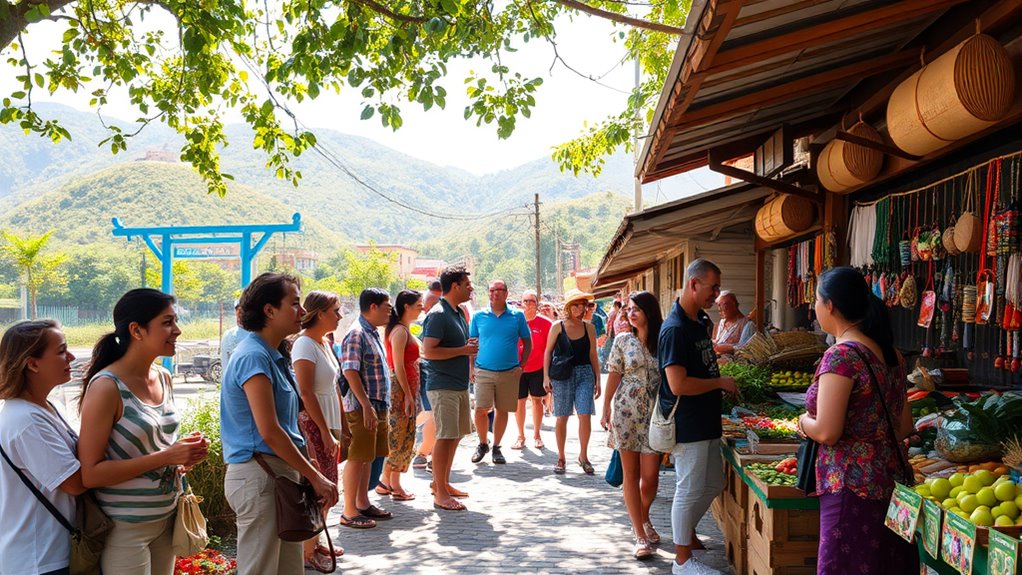Sustainable travel is all about protecting our planet while enjoying its beauty. To be an eco-conscious tourist, choose destinations with high sustainability scores and visit popular sites during off-peak times. Stay at eco-friendly accommodations and support local artisans by purchasing handmade items. Use reusable products like water bottles and shopping bags to minimize waste. Finally, engage in community initiatives for a meaningful experience. Discover more tips to enhance your sustainable travel journey!
Key Takeaways
- Choose eco-friendly accommodations with sustainability certifications to minimize environmental impact during your stay.
- Utilize public transport, biking, or walking to reduce your carbon footprint while exploring new destinations.
- Participate in local community initiatives or volunteer projects to support and empower local economies.
- Carry reusable items like water bottles and bags to minimize single-use plastics and waste during your travels.
- Engage in eco-friendly activities such as responsible wildlife tours or outdoor adventures that promote environmental conservation.
Understanding Sustainable Travel

Sustainable travel is more than just a trend; it’s a commitment to protecting the planet while exploring its beauty. By embracing sustainable tourism, you actively minimize negative impacts on the environment and respect local communities and economies. This responsible tourism approach guarantees that both hosts and visitors benefit. As the global community increasingly focuses on regulatory clarity, sustainable practices in travel may be further enhanced by emerging frameworks that support eco-friendly initiatives. Furthermore, data analytics can be utilized to assess the environmental impact of travel choices, helping travelers make informed decisions.
The UNWTO emphasizes considering economic, social, and environmental impacts, vital for preserving our natural wonders and cultural heritage for future generations. As you plan your adventures, remember that eco-friendly practices are essential, including utilizing renewable energy options like solar-powered accommodations. With searches for “sustainable travel” skyrocketing by 191% from 2020 to 2023, it’s clear that younger travelers, especially those aged 18-29, prioritize sustainability. By choosing eco-conscious options, you’re not only enhancing your experience but also protecting the places you love. Additionally, embracing sustainable living can lead to a more enriching travel experience, as you connect deeper with the local culture and environment.
Planning Your Trip

How can you make your trip both enjoyable and eco-friendly? Start by planning with sustainability in mind. Here are three tips to help you on your journey:
Plan your trip with sustainability in mind to ensure an enjoyable and eco-friendly experience.
- Choose Sustainable Destinations: Look for places with high sustainability scores, like those on the Global Destination Sustainability Index, to support responsible tourism. Additionally, researching the local filial responsibility laws can help you understand how your travel may impact the community. This awareness promotes responsible tourism practices that benefit both visitors and locals alike.
- Avoid Overtourism: Select less-trafficked locations or visit popular sites during off-peak times. This not only enhances your experience but also helps reduce carbon emissions.
- Utilize Technology: Use apps that highlight eco-friendly activities and local businesses. This guarantees your travel aligns with your eco-conscious values. Additionally, consider staying at eco-friendly accommodations that prioritize sustainability in their operations.
Choosing Eco-Friendly Accommodations

When you’re looking for a place to stay during your travels, choosing eco-friendly accommodations can make a significant difference. Look for certifications like LEED or EarthCheck that showcase a commitment to sustainability. These hotels often employ energy-efficient lighting, water conservation methods, and effective waste management systems. Additionally, many eco-friendly accommodations utilize high-efficiency ratings to reduce energy costs and environmental impact. Implementing preventive maintenance strategies can also ensure that the facilities operate at peak efficiency, further minimizing their ecological footprint. This commitment to sustainability often aligns with the principles of environmental innovations, which aim to reduce overall ecological impact. Furthermore, many eco-friendly hotels focus on natural materials that enhance both aesthetic appeal and sustainability.
| Benefits of Eco-Friendly Accommodations | Impact on Local Economy |
|---|---|
| Reduces environmental impact | Supports local businesses |
| Promotes sustainable practices | Strengthens community ties |
| Offers organic and locally sourced food | Encourages responsible tourism |
Practicing Responsible Tourism

Practicing responsible tourism means making choices that benefit both the environment and the local communities you visit.
By embracing responsible tourism, you can help reduce waste and support local economies. Additionally, consider exploring national parks that promote conservation and provide unique outdoor experiences. Many parks offer opportunities to learn about wildlife conservation efforts in the area, such as cultural festivals that celebrate the natural beauty and heritage of the region.
Here are three key ways to do this:
- Choose Eco-Friendly Transport: Opt for public transit, biking, or walking to greatly reduce your carbon footprint.
- Engage in Community Initiatives: Participate in clean-up efforts or conservation activities, giving back to the destinations you explore.
- Buy Local: Support local artisans and businesses by purchasing handmade souvenirs and dining at local restaurants, helping sustain cultural heritage. Additionally, being mindful of financial scams targeting seniors can ensure that your contributions positively impact the community without inadvertently supporting harmful practices.
Supporting Local Economies

Supporting local economies is essential for fostering vibrant communities and sustainable travel experiences. By supporting local businesses, you not only enrich your trip but also contribute to the resilience of the community. Engaging in community-based tourism allows you to immerse yourself in local culture while empowering residents. Consider dining at local restaurants, where 80% of your spending stays within the community, compared to only 20% at chains. Additionally, buying handmade souvenirs supports artisans and preserves cultural heritage. Furthermore, opting for eco-friendly materials in your purchases can enhance the sustainability of your travel. In destinations like Fort Worth, Texas, local attractions such as the Stockyards showcase the rich cowboy culture while benefiting local economies. By prioritizing local vendors, you also promote diversification in the local economy, creating a more stable financial environment. Here’s a quick look at the benefits of supporting local economies:
| Action | Impact on Community |
|---|---|
| Dine locally | Retains 80% of spending |
| Buy handmade crafts | Preserves traditional art |
| Join volunteer projects | Creates lasting change |
| Stay at local hotels | Boosts local employment |
| Participate in tours | Enhances cultural exchange |
Supporting local businesses aligns with the journey to parenthood, as it fosters connections and nurtures community bonds.
Minimizing Waste and Pollution

To minimize waste and pollution during your travels, always carry reusable items like water bottles and shopping bags. You can make a difference by properly disposing of waste and recycling wherever possible. Small actions like these not only reduce your environmental impact but also encourage others to adopt sustainable practices. Additionally, consider using portable solar panels to power your devices, which can significantly reduce reliance on fossil fuels. Furthermore, being mindful of color accuracy in your visual experiences, such as choosing eco-friendly projectors, can enhance your enjoyment while traveling sustainably. When traveling, always ensure that your accommodations follow safety precautions to minimize environmental hazards and support eco-friendly initiatives.
Reusable Items Importance
While traveling can be a thrilling experience, it often comes with a substantial environmental cost due to single-use items.
To embrace eco-conscious tourism, consider these reusable alternatives to help reduce plastic waste:
- Reusable Water Bottle: By using a reusable water bottle, you can save about 167 plastic bottles per year, considerably cutting down on single-use plastics.
- Shopping Bags: Carry reusable shopping bags to eliminate the need for millions of plastic bags, which take hundreds of years to decompose.
- Straws and Toiletries: Opt for reusable straws and solid toiletries like shampoo bars to prevent the consumption of single-use plastics that harm marine life.
Making these small changes can have a big impact on protecting our planet.
Proper Waste Disposal
Proper waste disposal is essential for minimizing pollution and protecting the environment, especially given that tourism generates about 319,000 tons of waste each year.
You can reduce waste by always disposing of trash in designated bins to prevent littering, which harms local ecosystems. When available, participate in recycling efforts, as many places have systems to promote resource recovery and lessen landfill waste.
Carry reusable bags and containers to cut down on single-use plastics, a major contributor to ocean pollution and environmental degradation.
Educate yourself on local waste management rules and practices; this guarantees compliance and supports community efforts.
Engaging in Sustainable Activities

When you travel, engaging in sustainable activities can enrich your experience while benefiting the environment.
Opt for eco-friendly adventures like hiking or kayaking, and seek out responsible wildlife tours that prioritize animal welfare.
These choices not only create lasting memories but also support conservation efforts and local communities.
Responsible Wildlife Encounters
How can you guarantee your wildlife encounters are both memorable and ethical?
By choosing responsible wildlife encounters that prioritize conservation and community-based wildlife tourism, you’ll assure both enjoyment and ethical practices.
Here are three tips to help you choose wisely:
- Select Ethical Tours: Look for tours certified by recognized conservation organizations that don’t exploit wildlife or involve direct interactions.
- Follow Wildlife Guidelines: Maintain a safe distance from animals and avoid loud noises to minimize stress on their habitats.
- Support Local Initiatives: Engage in community-based wildlife tourism to empower local populations and contribute to conservation efforts.
Eco-Friendly Adventure Activities
Engaging in eco-friendly adventure activities not only allows you to explore the great outdoors but also helps protect the environment for future generations. Activities like hiking, kayaking, and wildlife watching promote physical health while minimizing your carbon footprint. By choosing local guides, you support local communities and gain valuable insights into the area’s ecology. Participating in eco-tours enhances your understanding of biodiversity and guarantees animal welfare is respected. Plus, you can give back through activities like beach clean-ups or tree planting, deepening your connection to nature.
| Eco-Friendly Activity | Impact on Environment |
|---|---|
| Hiking | Protects natural habitats |
| Kayaking | Reduces carbon footprint |
| Wildlife Watching | Supports conservation efforts |
Educating Yourself and Others

As you explore the world, staying informed about sustainable travel practices not only enhances your experience but also empowers you to make choices that benefit the environment and local communities.
Here are some sustainable travel tips to guide you:
- Research Sustainability Efforts: Look for attractions with eco-certifications, like LEED, to support facilities prioritizing conservation.
- Engage with Local Organizations: Connect with groups focused on environmental and cultural preservation to gain insights and promote responsible tourism.
- Share Your Knowledge: Discuss sustainable practices with fellow travelers, raising awareness and encouraging others to support local communities.
Frequently Asked Questions
What Are the 5 P’s of Sustainable Tourism?
The 5 P’s of sustainable tourism are People, Planet, Prosperity, Peace, and Partnership.
When you travel, focus on how your actions impact local communities, ensuring you enhance their cultural heritage and quality of life.
Protect the planet by minimizing your environmental footprint.
Support local economies by reinvesting in the community.
Promote peace by respecting local customs, and foster partnerships among travelers, businesses, and governments to create a more sustainable tourism industry.
What Are the 3 P’s of Sustainable Tourism?
Imagine a balanced scale, with three weights: People, Planet, and Profit. These are the 3 P’s of sustainable tourism.
You’re ensuring that local communities thrive while respecting their cultures, protecting the environment, and supporting the economy. Each weight plays a vital role—you empower the people, safeguard the planet, and foster lasting profits.
When you travel with these principles in mind, you help create a harmonious relationship between travelers and the destinations they visit.
How to Be an Eco-Friendly Tourist?
To be an eco-friendly tourist, start by choosing accommodations that have sustainability certifications.
Pack light and bring reusable items like a water bottle to minimize waste.
Use public transportation or trains instead of flying to reduce carbon emissions.
Support local economies by eating at locally-owned restaurants and buying handmade souvenirs.
Finally, engage in eco-friendly activities that promote conservation and cultural appreciation, enhancing your experience while protecting the environment.
What Are the 7 Forms of Sustainable Tourism?
When it comes to sustainable tourism, you’ve got to know the ropes!
There are seven main forms:
- ecotourism, which promotes environmental conservation;
- cultural tourism, focusing on local traditions;
- adventure tourism, combining thrills with sustainability;
- community-based tourism, empowering locals;
- regenerative tourism, which aims to restore ecosystems;
- responsible tourism, ensuring ethical practices;
- and farm tourism, connecting you with agriculture.
Each form enriches your travel experience while protecting the planet.
Conclusion
Incorporating sustainable practices into your travels not only enriches your experience but also helps protect our planet. Did you know that if every traveler cut their carbon footprint by just 20%, we could save as much as 1.5 billion tons of CO2 emissions annually? By choosing eco-friendly accommodations, supporting local businesses, and minimizing waste, you’re making a significant impact. So, let’s embrace eco-conscious tourism and guarantee our beautiful destinations remain vibrant for generations to come!









